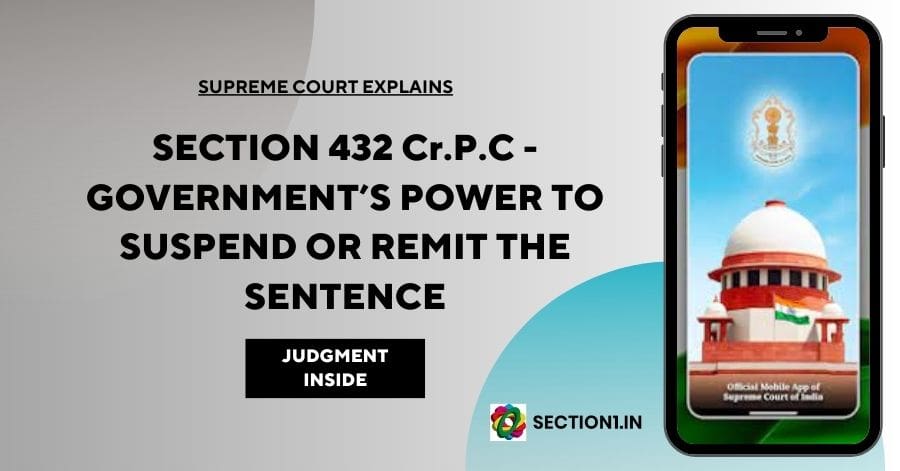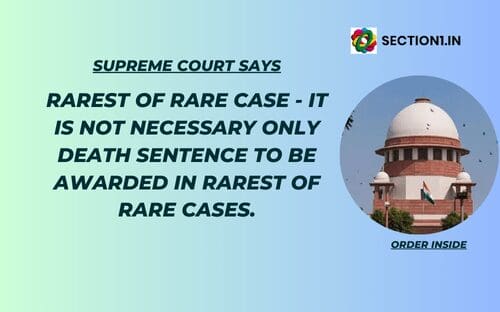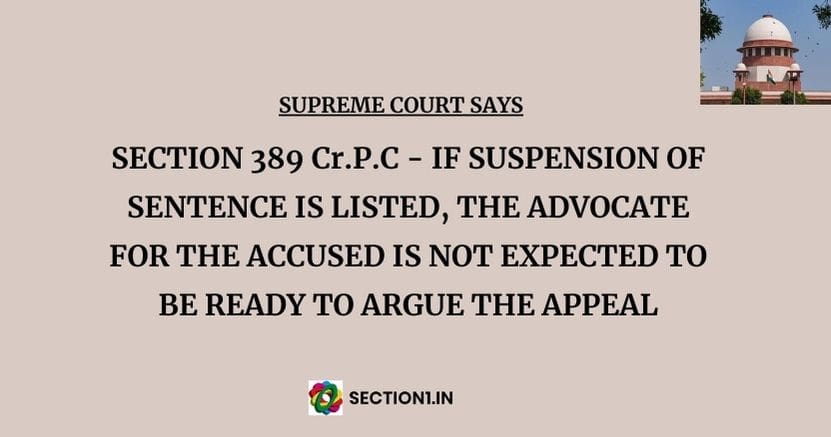GROUND ON WRIT PETITION
1. The petitioner, currently serving a sentence of life imprisonment for commission of offences punishable under Section 302/34 of the Indian Penal Code, 1860 and Section 27 of the Arms Act, 1959 approaches this court under its Article 32 jurisdiction, seeking appropriate direction to the first respondent to prematurely release him, on the ground that he has been in custody for 24 years without grant of remission or parole.
XXX
4. After the completion of the mandatory 14 years actual imprisonment, and 20 years of custody with remission, the petitioner’s case (application dated 14.04.2021) was considered by the Remission Board on 19.05.2021. In accordance with the prescribed rules, prior to this meeting, the opinion of the Presiding Officer of the convicting court, probation officer and Superintendent of Police, was also sought. The Board rejected the petitioner’s application for premature release – despite a favourable report by the Probation Officer and Superintendent of Police – noting the adverse report by the Presiding Judge.
ANALYSIS AND CONCLUSION
7. Section 432(1) of the Code of Criminal Procedure, 1973 (hereafter ‘CrPC’) empowers the appropriate government to suspend or remit sentences and applies only in the case of additional remission, over and above what is earned as per the jail manual or statutory rules [Sangeet v. State of Haryana [2012] 13 SCR 85]. Section 432(2) prescribes the procedure whereby the appropriate government may seek the opinion of the Presiding Judge of the court before, or by which the applicant had been convicted, on whether the applications should be allowed or rejected, along with reasoning. Section 432(2) of the CrPC is extracted for ready reference:
“432. Power to suspend or remit sentences.—(1)***
(2) Whenever an application is made to the appropriate Government for the suspension or remission of a sentence, the appropriate Government may require the Presiding Judge of the Court before or by which the conviction was had or confirmed, to state his opinion as to whether the application should be granted or refused, together with his reasons for such opinion and also to forward with the statement of such opinion a certified copy of the record of the trial or of such record thereof as exists.”
8. This statutory power to grant remission is limited by Section 433A (which was incorporated in the CrPC subsequently [By Act 45 of 1978, sec. 32 (w.e.f. 18.12.1978)] when it comes to those convicted for an offence where death is one of the punishments:
“433-A. Restriction on powers of remission or commutation in certain cases.—Notwithstanding anything contained in Section 432, where a sentence of imprisonment for life is imposed on conviction of a person for an offence for which death is one of the punishments provided by law, or where a sentence of death imposed on a person has been commuted under Section 433 into one of imprisonment for life, such person shall not be released from prison unless he had served at least fourteen years of imprisonment.”
9. Sentencing is a judicial exercise of power. The act thereafter of executing the sentence awarded, however, is a purely executive function – which includes the grant of remission, commutation, pardon, reprieves, or suspension of sentence [See Gopal Vinayak Godse v. State of Maharashtra [1961] 3 SCR 440; Maru Ram v. Union of India [1981] 1 SCR 1196; Sarat Chandra Rabha v. Khagendranath Nath [1961] 2 SCR 133; Kehar Singh v. Union of India [1988] Supp. 3 SCR 1102]. This executive power is traceable to Article 72 and 161 of the Constitution of India, by which the President of India, and Governor of the State, respectively, are empowered to grant pardons and to suspend, remit or commute sentences in certain cases. Whilst the statutory (under Section 432 CrPC) and constitutional (under Articles 72 and 161 of the Constitution) powers are distinct-the former limited power, is still an imprint of the latter (much wider power), and must be understood as such and placed in this context. This framework of executive power and how it is to be exercised, is lucidly explained, in the judgment of State of Haryana v. Jagdish [[2010] 3 SCR 716 [hereafter referred to as ‘Jagdish’]:
“27. Nevertheless we may point out that the power of the sovereign to grant remission is within its exclusive domain and it is for this reason that our Constitution makers went on to incorporate the provisions of Article 72 and Article 161 of the Constitution of India. This responsibility was cast upon the executive through a constitutional mandate to ensure that some public purpose may require fulfilment by grant of remission in appropriate cases. This power was never intended to be used or utilised by the executive as an unbridled power of reprieve. Power of clemency is to be exercised cautiously and in appropriate cases, which in effect, mitigates the sentence of punishment awarded and which does not, in any way, wipe out the conviction. It is a power which the sovereign exercises against its own judicial mandate. The act of remission of the State does not undo what has been done judicially. The punishment awarded through a judgment is not overruled but the convict gets benefit of a liberalised policy of State pardon. However, the exercise of such power under Article 161 of the Constitution or under Section 433-A CrPC may have a different flavour in the statutory provisions, as short-sentencing policy brings about a mere reduction in the period of imprisonment whereas an act of clemency under Article 161 of the Constitution commutes the sentence itself.”
10. That this executive power which is inherently discretionary in nature, has to be exercised fairly, reasonably, and not arbitrarily, has been held by this court in numerous cases [State of Haryana v. Mohinder Singh [2000] 1 SCR 698; Sangeet v. State of Haryana [2012] 13 SCR 85; Union of India v. V. Sriharan [2015] 14 SCR 613; Rajan v. The Home Secretary, Home Department of Tamil Nadu [2019] 6 SCR 1035; Ram Chander v. State of Chhattisgarh [2022] 4 SCR 1103]. Absence to do so, would – like is the case for other executive action – compel the court to exercise its judicial review, and in appropriate cases remit the matter for reconsideration [See Rajan and Ram Chander (ibid)]. The procedure laid out in Section 432(2), has been held to be mandatory by a five-judge bench of this court, in Union of India v. V. Sriharan [[2015] 14 SCR 613 [hereafter referred to as ‘Sriharan’]]. The court also observed how the said procedure operated as a safeguard, much like the ones provided under Article 72 and 161 of the Constitution:
“……………”The court then proceeded to approve the following reasoning in Sangeet v. State of Haryana11 on this point (Sangeet SCR pp. 119-120):
“…………”
11. This court, in various judgments, has outlined the parameters to be considered, when considering grant of remission. In Jagdish (supra) this court held:
“38. At the time of considering the case of premature release of a life convict, the authorities may require to consider his case mainly taking into consideration whether the offence was an individual act of crime without affecting the society at large; whether there was any chance of future recurrence of committing a crime; whether the convict had lost his potentiality in committing the crime; whether there was any fruitful purpose of confining the convict any more; the socio-economic condition of the convict’s family and other similar circumstances.” (emphasis supplied)
This was based on an earlier judgment (though not expressly cited in Jagdish) – Laxman Naskar v. State of W.B [(2000) 2 SCC 595 [para 6] [hereafter referred to as ‘Laxman Naskar’]. These factors were reiterated in Laxman Naskar v. State of W.B. (2000) 7 SCC 626 [para 6] as well] which prescribed five guiding factors.
12. In Sriharan (supra), the court went on to discuss specifically, the role of the report submitted by the presiding officer, and held that the “ultimate order of suspension or remission should be guided by the opinion to be rendered by the Presiding Officer of the court concerned” [Para 143]. This in turn, was relied upon, and explained recently, in Ram Chander v. State of Chhattisgarh [[2022] 4 SCR 1103 [hereafter referred to as ‘Ram Chander’]] as follows:
“……………..”
IMPORTANCE OF PRESIDING JUDGE’S OPINION
13. Noting that the presiding judge’s opinion did not consider the five parameters laid out in Laxman Naskar (supra), a coordinate bench of this court in Ram Chander (supra) directed the presiding officer of the concerned court, to consider the matter afresh and in light of these factors, so that the appropriate government could in turn reconsider the petitioner’s application for premature release. A similar fate awaited the writ petitioner in Jaswant Singh v. State of Chhattisgarh [Jaswant Singh v. State of Chhattisgarh, 2023 SCC OnLine SC 3] (wherein both writ petitions arose from the same facts and commission of offence).
xxx
VALUE AND IMPACT OF PRESIDING JUDGE’S OPINION
15. The record clearly indicates that the reason for rejection of the petitioner’s application, is the adverse report submitted by the presiding judge in the first round, which was perfunctorily relied upon and reiterated in the report submitted by the then presiding judge in the second round as well. Both the reports submitted by the presiding judges (at the relevant time), demonstrate a casual opinion, based solely on the judicial record which presumably consisted of the finding of guilt, by the trial court and High Court. This offers only a dated insight on the petitioner, one that has limited opportunity to consider the progress the convict has made in the course of serving his sentence. Yet, the Remission Board has privileged the presiding judge’s opinion over the other authorities – like the Probation Officer, and Jail authorities, who are in a far better position to comment on his post-conviction reformation – offering a cautionary tale.
16. In this court’s considered view, overemphasis on the presiding judge’s opinion and complete disregard of comments of other authorities, while arriving at its conclusion, would render the appropriate government’s decision on a remission application, unsustainable. The discretion that the executive is empowered with in executing a sentence, would be denuded of its content, if the presiding judge’s view – which is formed in all likelihood, largely (if not solely) on the basis of the judicial record – is mechanically followed by the concerned authority. Such an approach has the potential to strikes at the heart, and subvert the concept of remission – as a reward and incentive encouraging actions and behaviour geared towards reformation – in a modern legal system.
17. All this is not to say that the presiding judge’s view is only one of the factors that has no real weight; but instead that if the presiding judge’s report is only reflective of the facts and circumstances that led to the conclusion of the convict’s guilt, and is merely a reiteration of those circumstances available to the judge at the time of sentencing (some 14 or more years earlier, as the case may be), then the appropriate government should attach weight to this finding, accordingly. Such a report, cannot be relied on as carrying predominance, if it focusses on the crime, with little or no attention to the criminal. The appropriate government, should take a holistic view of all the opinions received (in terms of the relevant rules), including the judicial view of the presiding judge of the concerned court, keeping in mind the purpose and objective, of remission.
18. The views of the presiding judge, are based on the record, which exists, containing all facts resulting in conviction, including the nature of the crime, its seriousness, the accused’s role, and the material available at that stage regarding their antecedents. However, post-conviction conduct, particularly, resulting in the prisoner’s earned remissions, their age and health, work done, length of actual incarceration, etc., rarely fall within the said judge’s domain. Another factor to bear in mind, is that the presiding judge would not be the same presiding judge who had occasion to observe the convict (at a much earlier point in time) and thus form an opinion. The presiding judge, at this stage, would only look into the record leading to conviction. This judicial involvement in executive decision making is therefore, largely limited to the input it provides regarding the nature of the crime, its seriousness, etc. Undoubtedly, even at the stage of sentencing, the judge ideally is to exercise discretion after looking at a wide range of factors relating to the criminal and not just the crime; but as noticed in numerous precedents [Sangeet (supra); Swamy Shraddananda (2) @ Mural Manohar Mishra v. State of Karnataka [2008] 11 SCR 93; Santosh Kumar Satishbhushan Bariyar v. State of Maharashtra [2009] 9 SCR 90; Chhannu Lal Verma v. State of Chattisgarh [2018] 14 SCR 355; Rajendra Pralhadrao Wasnik v. State of Maharashtra [2018] 14 SCR 585; and Manoj v. State of Madhya Pradesh [2022] 9 SCR 452]. that have dealt with sentencing in the commission of heinous crimes, this is unfortunately, often not the reality. Guidance has been offered by this court [Ibid]. on how to mitigate this in recent years, but in this court’s considered view, it is pragmatic to acknowledge that it will require time for our criminal justice system to incorporate, and uniformly reach such standards. In fact, earlier cases of conviction (such as the present one – in 2001), have an even lesser probability of a judicial record which reflects consideration of such multi-dimensional factors at the sentencing stage; the lack of which should not serve as an obstacle to the convict seeking release (after serving almost two decades, or more), erasing the reformative journey they may have undertaken as a result of their long incarceration.
REFORMATIVE SENTENCING POLICY IS OUR AIM
19. It has been repeatedly emphasized that the aim, and ultimate goal of imprisonment, even in the most serious crime, is reformative, after the offender undergoes a sufficiently long spell of punishment through imprisonment. Even while upholding Section 433A, in Maru Ram v. Union of India [[1981] 1 SCR 1196], this court underlined the relevance of post-conviction conduct, stating whether the convict,
“Had his in-prison good behaviour been rewarded by reasonable remissions linked to improved social responsibility, nurtured by familial contacts and liberal parole, cultured by predictable, premature release, the purpose of habilitation would have been served, If law–S. 433-A in this case–rudely refuses to consider the subsequent conduct of the prisoner and forces all convicts, good, bad and indifferent, to serve a fixed and arbitrary minimum it is an angry flat untouched by the proven criteria of reform.”
xxx
25. In light of these findings and the precedents discussed above, it would be appropriate if the Remission Board reconsidered the petitioner’s application for remission afresh, considering the reports of the police and other authorities, the post-prison record of the petitioner, the remissions earned (including that which is earned for good conduct) his age, health condition, family circumstances, and his potential for social engagement, in a positive manner. The concerned presiding judge is hereby directed to provide an opinion on the petitioner’s application for premature release, by examining the judicial record, and provide adequate reasoning, taking into account the factors laid down in Laxman Naskar (supra), within one month from the date of this judgment. With the benefit of this new report, the Remission Board may reconsider the application – without entirely or solely relying on it, but treating it as valuable (maybe weighty) advice that is based on the judicial record. Given the long period of incarceration already suffered by the writ petitioner and his age, the Remission Board should endeavour to consider the application at the earliest and render its decision, preferably within three months from the date of this judgment. A copy of this judgment shall be marked by the Registry of this Court, to the Home Secretary, Government of Bihar, who is the chairperson of the Remission Board, as well as the concerned Presiding Judge, through the Registrar, High Court of Judicature at Patna High Court.
PARTY: RAJO @ RAJWA @ RAJENDRA MANDAL vs. THE STATE OF BIHAR & ORS – WRIT PETITION (CRIMINAL) NO(S). 252 OF 2023 – AUGUST 25, 2023.
https://main.sci.gov.in/supremecourt/2023/19923/19923_2023_8_1501_46428_Judgement_25-Aug-2023.pdf






